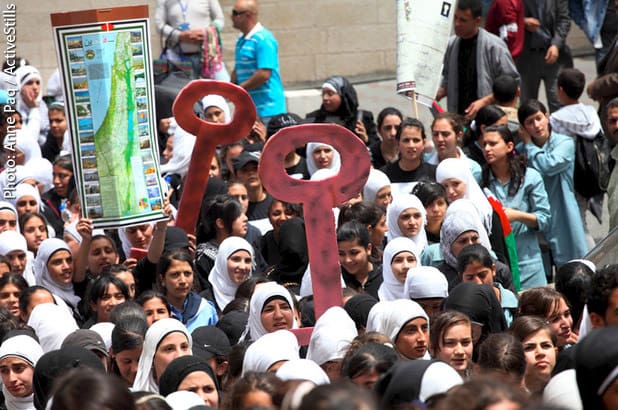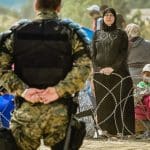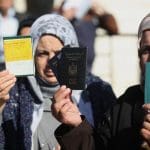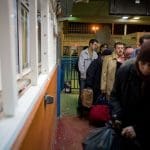
Overview
The Palestinian authorities should immediately start implementing the right of return, beginning with Gaza and without waiting for Israel, argues Al-Shabaka Policy Advisor Munir Nuseibah. While mindful of the political and physical pitfalls and problems, he carefully constructs the arguments in favor of the move in this policy brief. He cites the legal obligations, the ways in which the continuing occupation of Gaza need not be an obstacle, and the practical steps for beginning the implementation of the right of return, in however limited a manner.
The Legal Case for the Return of the Displaced Gazans
Israel has displaced the Palestinians from the Gaza Strip and prevented them from returning at different times and by using a variety of methods. Many were displaced by the wars of 1956 and 1967, and are still taking refuge in Egypt, Jordan or elsewhere. Others managed to stay after the 1967 war and were counted in the Israeli census and issued red-colored Gaza Strip ID cards. However, they were later forcibly displaced by Israel’s status revocation policy in two ways. First, Israel issued Palestinians travelling abroad Israeli exit permits or travel documents with an expiry date; if the permits expired, the Palestinians were not allowed to return and their status was moved to “ceased residency.” Israel also assigned this status to those who failed to participate in its 1981 and 1988 censuses. Israel exercised this policy until 1995 after the Palestinian Authority (PA) was installed in parts of the West Bank and Gaza, and only stopped after the interim peace agreement entered into force. As many as 108,878 Palestinians had their residencies revoked, a figure that only came to light last summer after the Israeli human rights organization HaMoked filed an application based on the Freedom of Information Act.
Obviously Israel, as the state that has committed mass displacement of the Palestinian people since 1947, is responsible for their displacement, and the leaders who ordered it are criminally liable according to international criminal law. This is clearly set out in the Fourth Geneva Convention and in human rights law. There is nothing new about the illegality of Israel’s displacement of Palestinians and its responsibility. What is new is that there are now authorities that can begin the process of return without in any way negating Israel’s responsibility.
When Israel unilaterally “disengaged” from the Gaza Strip it ended its physical presence and canceled the military legal regime, although it remains the occupying power because it maintains ultimate control of Gaza’s land, sea, and airspace. However, the overthrow of the Mubarak regime in Egypt raises hopes for consistent opening of the Rafah Crossing, even though the government of Muhammad Mursi is still applying the same Israeli guidelines to passage through the Crossing.
The potential of a change in the regime governing the Rafah Crossing places a serious responsibility on the Ramallah-based PA, the de facto government in Gaza, and/or the Palestine Liberation Organization (PLO), as well as the Egyptian government to facilitate the return of every person who was displaced from the Gaza Strip, regardless of how this displacement happened and when it took place. Of course, we know that Israel is not going to cooperate, but there is nothing to stop the Palestinian authorities and Egypt from taking the right of return out of the deep freeze to the extent possible and establishing a process of return and property restitution.
Indeed, it is urgent that the Palestinian authorities take action. First, there is an international legal obligation on any authority in control of a territory from which persons were displaced to allow for their full repatriation, regardless of whether it was responsible for the displacement or not.
Secondly, the Palestinian national movement, the Arab League, and the majority of the rest of the world have for decades called for the return of the refugees, a right blocked by Israel’s physical and regulatory barriers. Although the exercise of the right of Palestinian refugees to return to the West Bank including Jerusalem and to the cities and villages in what became Israel in 1948 is unfortunately not yet possible, this must not affect the right of those who were displaced from Gaza to return. To show that they are serious about the right of return, the Palestinian authorities should issue a clear declaration inviting return and setting out the arrangements for so doing.
Returning – Despite the Continuing Occupation of Gaza
The fact that the Israeli occupation of the Gaza strip is not over yet is irrelevant to the immediate implementation of return, and does not derogate from the responsibility laid on Israel as well as on the Palestinian and Egyptian authorities. There is no need for a territory to be free of occupation before its refugees and internally displaced are allowed to return. In fact, the United Nations has repeatedly demanded that Israel immediately allow the return of those displaced from the territories Israel occupied in 1967 while they were still occupied. For example, UN Security Council Resolution 237 of 1967 demanded that Israel “facilitate the return of those inhabitants who have fled the areas since the outbreak of the hostilities.” Since then, the UN General Assembly (UNGA) has annually issued resolutions demanding that Israel implement the Security Council resolution: UNGA Resolutions 2452 of 1968 and 2535 of 1969 called on Israel to take “effective and immediate steps” for the return of those who fled since the outbreak of hostilities and 2535 included the right of the “displaced persons and the refugees” among the “inalienable rights of the people of Palestine.” The affirmation of the right of the displaced persons to return continued after the peace process began, with calls for an “accelerated return through the mechanism agreed upon by the parties” (e.g. UNGA Resolution 50/28C of 1995.) In other words, the UN never linked the return of the displaced to the end of the occupation.
It is also important to note that Israel itself has not in principle adopted a position against the return of those displaced from Gaza and the West Bank, even though the occupation was still in place. The Camp David Egyptian-Israeli Framework Agreement provided that a committee of the “representatives of Egypt, Israel, Jordan, and the self-governing [Palestinian] authority” would agree the modalities to admit those displaced from the West Bank and Gaza in 1967 (West Bank and Gaza Article (3)(vi).)
Similarly, the 1994 Jordanian-Israeli peace treaty provided for the plight of the “displaced persons” to be negotiated “in a quadripartite committee together with Egypt and the Palestinians” (Article 8(2).) The Declaration of Principles (DOP) between the PLO and Israel also provided for “cooperation arrangements” between Israel, the PLO, Jordan and Egypt to decide on the modalities of return (Article XII.) In addition, the Palestinian-Israeli Interim Agreement provided that a “joint committee” would “solve the reissuance of identity cards” to those who had had their residency revoked (Appendix III, Article 28 (3).)
All of the above implies recognition of the right of those displaced to return to their homes in the occupied Palestinian territory (OPT.) However, Israel used various tricks and tactics during the negotiations on the principles to repatriate the 1967 displaced persons to ensure that this never took place. However, it is still worth emphasizing the point that there was never an assumption that an end of occupation was needed before the return of any refugee or displaced person.
Discounting Other Obstacles to Return to Gaza
A major and real obstacle that can be raised regarding the displaced Gazans’ return is Israel’s continued control over the Palestinian population registry as a result of the Interim Agreement, and its decision in the year 2000 to freeze the registry, thus preventing any family unification or return of displaced persons. Of course, while the West Bank is still under full Israeli physical and regulatory control, the fact that no one can be added to the Palestinians’ copy of the population registry also means that no refugee or other non-registered Palestinian can physically enter and reside in the West Bank. The situation in Gaza Strip is different.
Israel’s unilateral disengagement from Gaza in 2005 and Egypt’s easing of passage through the Rafah Crossing, albeit under guidelines agreed with Israel, means that Israel is no longer in full control of the Crossing. Israel does not have soldiers stationed at the Crossing to prevent people from entry, so why should Egypt do so? It is the responsibility of the authorities on the ground – Egypt and the Palestinian authorities – to allow the immediate return of the displaced Gazans.
As part of their full repatriation, displaced persons must have the same status as their co-citizens. They should not be left without an ID card and a passport and be exposed to a new era of injustice. Thus, it would be essential that, as part of the return process, the Palestinian authorities register the returnees in their copy of the population registry, and issue them the proper ID cards and passports with or without Israel’s consent. The freeze that Israel is imposing on the population registry is not only a violation of the interim agreement itself but more importantly a violation of international human rights law and international humanitarian law. Thus, the issuing of such ID cards would certainly be consistent with international law.
The Palestinian Authority in Ramallah recently declared that it intended to issue new IDs in the name of “The State of Palestine” and that Palestinian refugees and displaced persons in the diaspora would also be able to benefit from such documents. This could be a positive step if those displaced from Gaza would be entitled to acquire the documents to actually help them return and be reintegrated. Indeed, in order to give this decision teeth priority in issuing ID cards and passports should be given to those who want to return to Gaza. Moreover, it is essential that the documents the returnees receive not be distinguishable from documents held by other Palestinians in Gaza in order to prevent discrimination against them, especially during their travel.
It is also worth noting that, while reconciliation between the two Palestinian authorities in the West Bank and Gaza is necessary for many reasons, there is no need to wait until it has been achieved before opening the gate of return to those displaced. There is also no need to think about the question of the “legitimacy” of any authority or government; this is an irrelevant question. As stated above, any authority in control of a territory is under obligation to allow refugees and displaced persons to return. Any postponement to the return of those who deserve the chance to return home because of arguments about which authority is the “legitimate government” would waste this rare and precious moment in history when for the first time it is possible to act upon one of the most important symbols for the Palestinian people.
There was an earlier moment when a return of displaced persons to Gaza could have been attempted: During the 2005 Israeli disengagement from Gaza. Indeed, at the time the Palestinian residency and refugee rights organization Badil consulted with lawyers to look at possible pitfalls and see if there was any political will to start work on refugee return and property restitution in Gaza. But the PA was not receptive and then the Hamas take-over of Gaza followed by the Israeli war on Gaza sidetracked the effort. Now the opportunity exists again, and those who were or might be responsible for delaying Palestinian return should keep in mind that they are liable under international law.
Many other obstacles could be cited to prevent the displaced Gazans’ return, for example that the Gaza Strip already facing enormous problems and projected to be uninhabitable if current trends continue or that the situation of Palestinians from Gaza is especially precarious in Jordan, which is trying to minimize its Palestinian population and their rights. However, all such obstacles can be addressed, as discussed in the next section.
Unfortunately, the remaining Palestinian refugees and displaced persons are not affected by this opportunity for the sole reason that Israel’s regulatory and physical barriers are still present in the places to which the refugees are supposed to return. Nonetheless, this should not be a reason to delay the process of return for those who can exercise this right.
How to Implement the Return to Gaza
To fully redress the longstanding injustice done to those displaced from Gaza it is not enough to simply open the borders and issue ID cards. There needs to be a comprehensive transitional justice program that would address the different concerns and needs of the victims of displacement, and give them a well-founded feeling that their return would mark a new beginning. Thus, it is essential to follow the universal standards that are used to organize return processes, many of which were codified by Special Rapporteur Paulo Sérgio Pinheiro in 2005 (known as the Pinheiro Principles and available in English and Arabic among other languages.) The issues that should be taken into account in applying the Pinheiro Principles to the return of the persons displaced from Gaza can be summarized in seven steps.
- The PA should make a clear declaration inviting the persons displaced from Gaza to exercise their right of voluntary return. The declaration should explain honestly that the only possible return so far is to Gaza because Israel’s physical and regulatory barriers are still in place in the rest of Palestine/Israel. The declaration should allow the refugees to exercise a “free, informed, and individual choice” (Principle 10.1) The returnee should be guaranteed a dignified journey and return, a responsibility the PA and Egypt have to take seriously. The returning person must be given the time to make a clear and informed decision, which could include a visit to Gaza before he/she makes the final decision to return.
- Any country that hosts a refugee or displaced person from Gaza must remember that the refugee also has a right not to return. Therefore, no refugee or displaced person shall be forced to return to Gaza (Principle 10.3.)
- The PA should enact any legal amendments that would allow for the admission, reintegration and rehabilitation of the displaced person deciding to return. This must include the right to a speedy registration in the population registry and issuance of the relevant documents like an ID card and passport (Principle 18.) If a returning displaced person only chooses to claim his/her ID card and passport but not to actually reside in Gaza, he/she should be entitled to do so.
- A simultaneous restitution of property (especially real estate) program must be immediately put in place to facilitate the judicial or administrative processing of the restitution claims and give both those who chose to return and those who chose not to return the chance to re-possess their property (Principle 13.)
- A just policy needs to be put in place concerning secondary occupants who may be residing in the property of the returnee. In all circumstances a secondary occupant must not be arbitrarily evicted from a disputed property, and his/her interest must be carefully assessed and protected (Principle 17.)
- Israel is solely responsible for compensation for the refugeehood of the Gaza Palestinians, as with all Palestinians. Israel is also solely responsible for compensating cases where restitution of property is impossible. However it is recommended that the Palestinian authority still provide some sort of compensation, either to individuals or in the form of collective rehabilitation programs, perhaps with assistance from the international community (Principle 21.) This would give the international community an opportunity to put its words into action when it comes to the repatriation of the Palestinian 1967 displaced persons. Waiting for Israel to live up to its international obligations would certainly delay the rehabilitation and reintegration process, although, of course, it would have to reimburse any outlay by the Palestinians or the international community.
- Where possible, criminal charges against Israeli actors and any others responsible for past and present and displacement policies should be pursued.
Finally, given the history and the context of Israel’s continuous displacement of the Palestinians, it is important to call this process a Return (‘Awda). Using the kind of language used in the various peace process agreements – e.g. “modalities of admission” and “reissuance of identity cards” – is based on Israel’s longstanding policy of denial of responsibility. Nobody lost their identity cards: They were criminally and illegally stripped of their residency rights. The return of those displaced is not just a process of “admission” that comes through international cooperation: It is a return of those who have a right to exercise it because they were illegitimately and criminally forcibly displaced. The use of the right language would certainly be consistent with transitional justice principles, which encourage acknowledgment of the crime committed and reject denial.
Given that Israel’s physical and regulatory barriers have been the sole reason preventing Palestinian refugees and displaced persons from exercising their right of voluntary return, it would be a major missed opportunity not to implement at least a partial exercise of this right in an area where these barriers are loosening. The Palestinian national movement has for decades struggled for the right of return. It would not be acceptable not to take advantage of the opening to implement this right now that there is an opportunity to do so.
It is true that this opportunity would only be available to a small part of the displaced Palestinian persons and refugees, but this should not affect the rights of those who can do so, both as individuals and as part of the collective. The PA should soon introduce the necessary laws and procedures and issue a clear declaration calling upon those displaced from Gaza to return, if they wish to do so, and Egypt has an obligation to allow the returnees to pass through its territory and go home. We must make clear to the world that we are serious about the right of return.
The author would like to thank Nadia Hijab for her thoughtful comments and edits to this brief, as well as the two reviewers, Ingrid Jaradat and Dena Qaddumi, for their valuable feedback.
Munir Nuseibah is a human rights lawyer and academic based in Al-Quds University in Jerusalem, Palestine. He is an assistant professor at Al-Quds University’s faculty of law; the director (and co-founder) of Al-Quds Human Rights Clinic, the first accredited clinical legal education program in the Arab World; and the director of the Community Action Center in Jerusalem. He holds an LL.M in International Legal Studies from the Washington College of Law of the American University in Washington DC and a PhD degree from the University of Westminster in London, UK, where his thesis dealt with Forced Displacement in the Palestinian-Israeli Conflict, International Law, and Transitional Justice.













